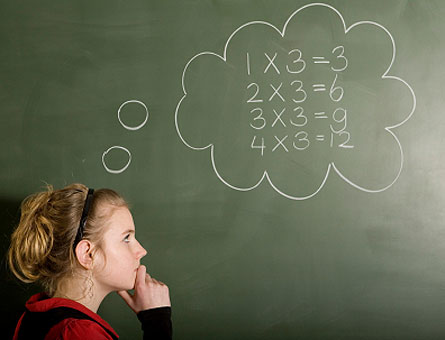The use of executive functions in math is often one of the key determinants of a student’s success in complex mathematics. Whether it be Working Memory — which helps children keep information in mind as they are doing a math word problem — or the organizational skills required to do a step-by-step series of calculations, these executive functioning skills are crucial to becoming proficient in mathematics. Executive functions such as Time Management and Planning can play a major role in study and test preparation, and can determine how effective children are at completing math assignments in an orderly, efficient fashion.
A series of studies has indicated the importance of developing executive functions in early ages for future academic and math success. For example, a study conducted by Rebecca Bull and her colleagues found that visuo-spatial short-term memory was an excellent predictor of math abilities. Studies also demonstrate how verbal Working Memory is crucial in the recall and application of math formulas when doing calculations.
Self-Awareness is also an executive skill which is very helpful in math. Teachers not only require their students to complete math examples correctly, but also explain their rationale and reasoning. Self-Awareness involves the capacity to think about one’s thinking and then share it in a way that others can understand. Self-Awareness skills help kids understand their own strengths and weaknesses, and can be helpful in determining areas in which more study is required.
[cjphs_content_placeholder id=”73534″ random=”no” ]
Understanding the impact of executive functioning skills on mathematics is very important for parents and teachers. Rather than viewing children’s difficulties with math as being the result of simply not understanding particular math operations, it may be that issues such as poor Working Memory, Organization, and Planning skills are having an impact on mathematical abilities. As a result, it is helpful to consider the role of these executive skills in mathematical competencies.
Strategies to Improve Math Skills & Executive Functions:
l.) Help improve flexibility skills. Complex math word problems often require some flexibility in thinking and may require more problem-solving and trial-and-error approaches.
2.) Improve visuo-spatial working-memory skills. Playing games such as Tetris and working on other spatial skills can be very important in developing skills not only in visually-based mathematics such as geometry or trigonometry but also in considering the step-by-step processes that are involved in more complex mathematics.
3.) Learn more. For more insight into the relationship between mathematics and executive functions, explore our charts about the connection among thinking skills, executive functions, and academics.





This article is super helpful for understanding how to properly approach a math course. Recently I have heard of the common issue of testing anxiety. Could some these strategies be used in order to cope with possible testing anxiety?
this article is very useful for me. thanks very much for psoting this article.
how could i get math game based executive function to improve math skills for elementary school?
Hi Nani, this chart from the article might help you. https://learningworksforkids.com/wp-content/uploads/AcademicChartExecutiveFunctionsThinkingSkillsConnections.pdf